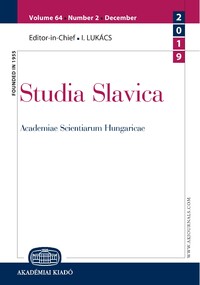Вітання й побажання в українській та чеській мовах
Greetings and wishes in Ukrainian and Czech
Author(s): Liudmyla Ivanovna DanylenkoSubject(s): Semantics, Phraseology
Published by: Akadémiai Kiadó
Keywords: Ukrainian; Czech; phraseology; etymology; semantics; greetings; well-wishing; communicative and functional characteristics
Summary/Abstract: The etymological characteristics of Ukrainian and Czech vocabularies are studied in a comparative way. It is stated that despite their common Proto-Slavic origin, the Ukrainian noun поздоровлення and the Czech word pozdrav have different etymological history. For the Czech language, the initial motivational model pozdrav ‘greeting’ was based on the concept of health. The same is revealed by the Ukrainian language in relation to the word поздоровлення, in contrast with the synonym вітання, which is etymologically related to vytaty ‘live’ and вітати ‘speak, address someone’. In both languages, the primary meanings of the lexical items of the semantic field “greetings, congratulations” (pozdravovat ‘greet’, gratulovat ‘congratulate’, blahopřát ‘welcome’, vinšovat ‘salute’) show signs of subjective friendliness, affection, and fellow feeling for someone, and they determine the model of language behaviour of the participants in communication. Wishing good health is the main cognitive component of greetings and congratulations. The paper also analyzes the phraseological formulas of greetings and wishes: Ukrainian Будьте здорові! and Czech Buďte v pohodě! Based on the data set of the dictionary-thesaurus of the Czech language, we can conclude that in terms of semantics, the modern Czech formula Buďte v pohodě! is much deeper than the classical Buďte zdrávi! because in the mind of a Czech speaker, the conceptual space of the word pohoda implies the concepts of health, happiness, joy, love, comfort, satisfaction, and well-being, which include values that are important to every individual. A special feature of the Czech formula Buďte v pohodě! is that it is a phraseological neologism first recorded by Czech dictionaries in the late 20th century. In comparison with the Czech language, we can observe the peculiarity of the Ukrainian greeting Многії літа! This formula went through a centuries-long process of integration from church life into everyday social life. In general, the study demonstrates that the main motivational models in the lexical and phraseological implementation of greetings and wishes are formed by the language system and discursive practice, which is based on speech etiquette or a significant event to which the addressee expresses attention, respect, and warm-hearted attitude.
Journal: Studia Slavica Academiae Scientiarum Hungaricae
- Issue Year: 65/2020
- Issue No: 1
- Page Range: 29-38
- Page Count: 10
- Language: Ukrainian
- Content File-PDF

